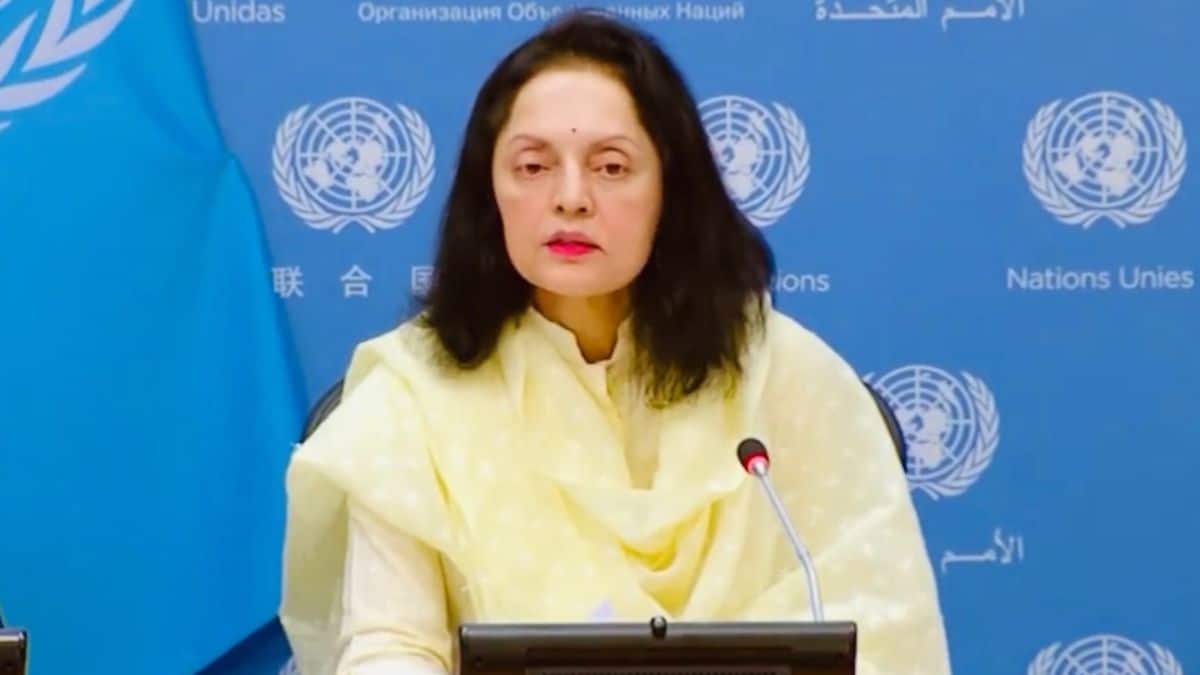Amid the escalating conflict between Israel and Hamas, India’s Permanent Representative to the United Nations, Ruchira Kamboj, has strongly condemned the loss of civilian lives and the humanitarian crisis that has resulted. She claims that the situation is “clearly unacceptable.” Speaking at a United Nations General Assembly (UNGA) meeting on the current situation in West Asia, Kamboj outlined India’s position, efforts to normalize the region, and commitment to humanitarian aid.
Kamboj emphasized the severe humanitarian crisis caused by the ongoing conflict, which disproportionately affects women and children. She emphasized India’s zero-tolerance policy toward terrorism while acknowledging that the terror attacks in Israel on October 7 were the immediate cause of the conflict. Kamboj condemned the attacks unequivocally, while also strongly condemning the loss of civilian lives.
According to Kamboj, India’s leadership has been in constant contact with leaders from both Israel and Palestine. The country has also been active in multilateral forums such as the G20, BRICS, and the Global South Summit, where it has reiterated its long-standing position on the Israel-Palestine conflict. India has repeatedly called for humanitarian assistance for the affected population and has expressed hope that Security Council Resolution 2720 will increase such assistance.
Furthermore, India has been making diplomatic efforts to mediate between the disputing parties. To facilitate dialogue, the Ministry of External Affairs in New Delhi has hosted discussions with representatives from both Israel and Palestine. These efforts demonstrate India’s commitment to resolving the conflict peacefully through diplomatic channels.
In response to the crisis, India has sent 70 tonnes of humanitarian aid to Palestine, including 16.5 tonnes of medicine and medical supplies. A total of USD 5 million in financial assistance has been provided, with USD 2.5 million going to the United Nations Relief and Works Agency for Palestine refugees in the Near East. This contribution is intended to support core programs and services for Palestinian refugees, such as education, healthcare, relief, and social services.
India’s consistent provision of aid demonstrates not only its commitment to peace but also to the welfare of the affected population. Humanitarian efforts go beyond meeting immediate needs, focusing on long-term solutions and support for the Palestinian people.
Beyond the United Nations, India has actively engaged with regional and global partners to comprehensively address the Israel-Hamas conflict. The country has used its Middle Eastern relationships, including diplomatic ties with Saudi Arabia, the United Arab Emirates, and Iran, to foster a coordinated regional response. India’s diplomatic reach extends to Western powers, where it has sought collaboration with the United States and European nations to find a long-term solution.
On the global stage, India has proposed resolutions and initiatives aimed at de-escalating tensions in the region. The country has repeatedly stressed the importance of a united international front in addressing the root causes of the conflict and working toward long-term peace.
Kamboj reaffirmed India’s commitment to a two-state solution, emphasizing that the only way forward is through dialogue and diplomacy. The envoy emphasized the importance of preventing escalation, ensuring the continued delivery of humanitarian aid, and working to restore peace and stability in the region as soon as possible.
India’s support for a two-state solution is consistent with international agreements and UN resolutions. The country believes that the key to a stable and secure Middle East is a sovereign and independent Palestine coexisting peacefully with Israel. India has consistently urged both parties to return to the negotiating table and address key issues such as borders, refugees, and Jerusalem’s status.
Throughout the conflict, India’s message has been consistent and clear. The country is adamant about the need for de-escalation, the rejection of violence, and the establishment of conditions for the early resumption of direct peace talks. Kamboj emphasized India’s unwavering commitment to achieving a just, peaceful, and long-term solution to the Israel-Palestine conflict through direct and meaningful negotiations on final status issues between both parties.

